Book Launch for The Routledge Handbook of Refugee Narratives
Friday April 14, 2023, 12:00 – 1:30 PM (PST); Buchanan Tower, Room 997 (Postponed from March 8)
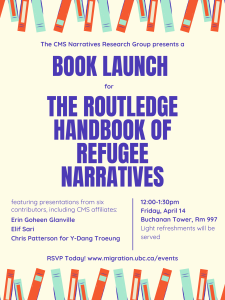
Come celebrate the publication of The Routledge Handbook of Refugee Narratives (2023), co-edited by Evyn Lê Espiritu Gandhi (UCLA) and Vinh Nguyen (Renison University College, University of Waterloo). The book includes chapters by three CMS faculty affiliates: Erin Goheen Glanville, Elif Sari, and the late Y-Dang Troeung.
This open-access Handbook presents a transnational and interdisciplinary study of refugee narratives, broadly defined. Interrogating who can be considered a refugee and what constitutes a narrative, the thirty-eight chapters included in this collection encompass a range of forcibly displaced subjects, a mix of geographical and historical contexts, and a variety of storytelling modalities.
The book launch will feature presentations from six of the volume’s authors: Erin Goheen Glanville, Elif Sari, Christopher Patterson for Y-Dang Troeung, Bishupal Limbu, Roopika Risam, and Asha Varadharajan. They will be introduced by co-editors Evyn Lê Espiritu Gandhi and Vinh Nguyen.
Please RSVP through the following link: https://migration.ubc.ca/events/event/book-launch-for-the-routledge-handbook-of-refugee-narratives/
Broken Angel: Film Screening + Filmmaker Q&A with Jules Arita Koostachin
Thursday March 23, 2023, 6- 8:30PM (PST); Choi Building, Room 120
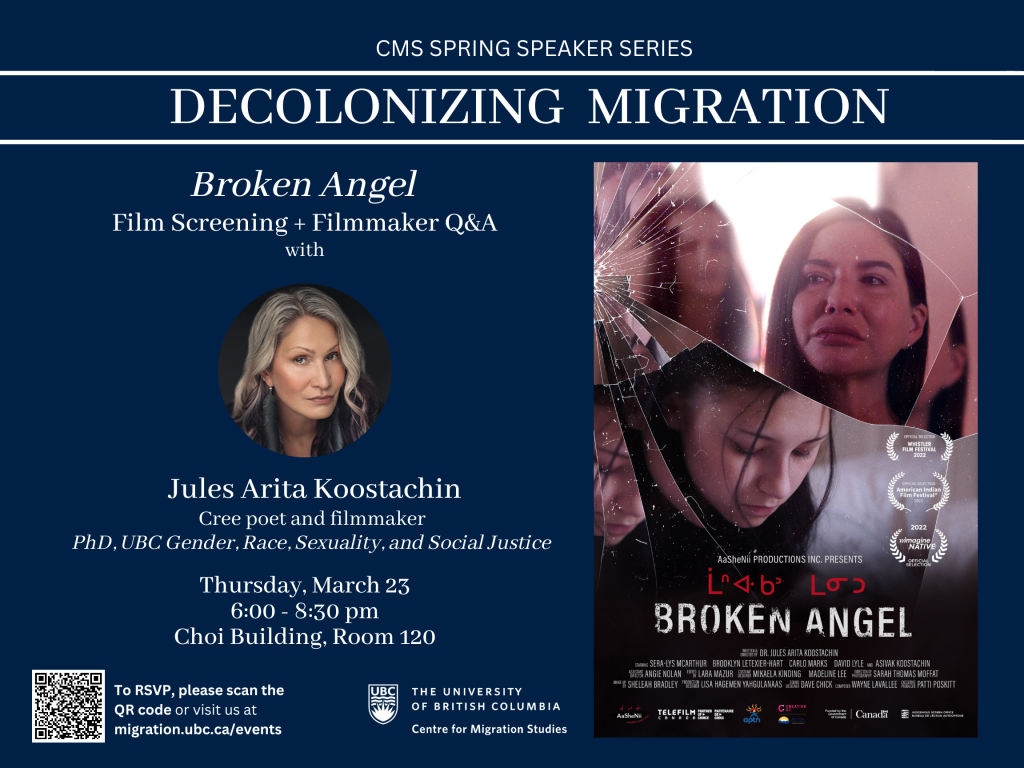
Join us for a screening of the feature film, Broken Angel, written and directed by Jules Arita Koostachin (PhD, UBC Gender, Race, Sexuality, and Social Justice). Dr. Koostachin will be in attendance for an engaging Q&A after the film, moderated by CMS Affiliate and scholar of new media, Elizabeth “Biz” Nijdam(UBC Central, Eastern, and Northern European Studies). This is the third event in our Spring Speaker Series, Decolonizing Migration.
Link for more information: https://migration.ubc.ca/events/event/broken-angel-by-jules-arita-koostachin-film-screening-filmmaker-qa/
Ziegler Lecture: Max Czollek, “Radical Diversity and Deintegration”
Thursday January 19, 2023, 11AM – 12:30PM (PST); BUCH D301
Radical Diversity and Deintegration: Jewish Identity Formation and Agency in Contemporary Germany
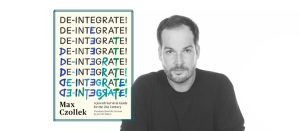
Join us on January 19 at 11:00am (PT) for the Ziegler Lecture Series, featuring Max Czollek. This talk is co-organized by the CMS Narratives Research Group and UBC Department of Central, Eastern and Northern European Studies.
RSVP to cenes.events@ubc.ca to attend this in-person event.
Abstract: Max Czollek is a poet, publicist and political scientist. He received his doctorate from the Center for Research on Anti-Semitism at the Technische Universität Berlin and is particularly well known for his theatrical and essayistic work surrounding memory culture, integration and Jewish identity in post-National Socialst Germany. Theaters works include De-Integration. A Congress on contemporary Jewish positions and the Days of Radical Jewish Culture at Maxim Gorki Theater as well as the international Days of Jewish-Muslim Hegemony. His essay volumes Desintegriert Euch! (De-integrate!) and Gegenwartsbewältigung (Overcoming the Present) are published with Carl Hanser Verlag, his collections of poetry at Verlagshaus Berlin. He is co-editor of the magazine Jalta – Positionen zur jüdischen Gegenwart. (Yalta – Positions on the Jewish Present). Most recently, he has co-curated an exhibition on Jewish Revenge: History and Fantasy at the Jewish Museum Frankfurt (Hanser 2022), and has been presenting and reading from the new English translation of De-Integrate: A Jewish Survival Guide for the 21st Century (Restless Books 2023).
Sawchen Lecture: Slavenka Drakulić, “Café Europa Revisited: How to Survive Post-Communism”
Thursday November 3, 2022, 11AM – 12PM (PST)
Join us on November 3 at 11 am Pacific Time for the virtual Sawchen Lecture Series, featuring Slavenka Drakulić in conversation with Professor emeritus Peter Stenberg, moderated by Dr. Markus Hallensleben. This talk is co-organized by the UBC CMS Research Narratives Group.
Register here via Zoom: https://ubc.zoom.us/webinar/register/WN_VMfSwDErS5qeNVdSyfRVHw
There is limited seating available to attend this event in person. Please RSVP directly to cenes.events@ubc.ca to reserve your seat.
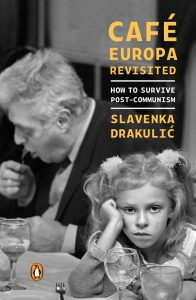 Title: “Café Europa Revisited: How to Survive Post-Communism”
Title: “Café Europa Revisited: How to Survive Post-Communism”
Abstract: Slavenka Drakulić will be reading from her newly translated book, Café Europa Revisited: How to Survive Post-Communism (2021), followed by a discussion of actual political events in Central and Eastern Europe. The volume is an “evocative and timely collection of essays that paints a portrait of Eastern Europe thirty years after the end of communism. An immigrant with a parrot in Stockholm, a photo of a girl in Lviv, a sculpture of Alexander the Great in Skopje, a memorial ceremony for the 50th anniversary of the Soviet-led army invasion of Prague: these are a few glimpses of life in Eastern Europe today. Three decades after the Velvet Revolution, Drakulić takes a look at what has changed and what has remained the same in the region in her daring new essay collection.” (https://slavenkadrakulic.com/bibliography/cafe-europa-revisited-how-to-survive-post-communism/)
![]() Bio: Slavenka Drakulić, born in Croatia (former Yugoslavia) in 1949, is a journalist and a writer whose books have been translated into many languages. Her best-known book in the USA is How We Survived Communism and Even Laughed. Her last collection of essays, Café Europa Revisited: How to Survive Post-Communism, was published by Penguin Random House.
Bio: Slavenka Drakulić, born in Croatia (former Yugoslavia) in 1949, is a journalist and a writer whose books have been translated into many languages. Her best-known book in the USA is How We Survived Communism and Even Laughed. Her last collection of essays, Café Europa Revisited: How to Survive Post-Communism, was published by Penguin Random House.
June 20 – 22, 2022 (Virtual) | June 29 – July 1, 2022 (In-Person)
Twenty-Eighth International Conference of Europeanists
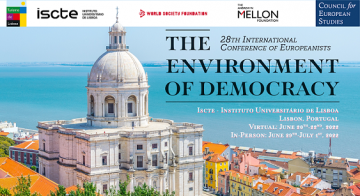
Iscte – Instituto Universitário de Lisboa | Lisbon, Portugal
https://ces-columbia.secure-platform.com/a/organizations/main/home
ECRN Mini Symposium on Decolonization as Theater – Decentering and Disrupting Colonial Spaces and Narratives
(organized by Markus Hallensleben, UBC)
[33] Decolonization as Theater: Decentering and Disrupting Colonial Spaces and Narratives – Artist Roundtable on Performing Decolonization – Panel 1
6/22/2022
5:00 PM to 6:30 PM GMT+1
6:00 PM to 7:30 PM CEST
12:00 AM to 1:30 PM EDT
Zoom Room 4
Book Panel / Roundtable
Chair: Markus Hallensleben – University of British Columbia
Katrin Sieg – Georgetown University
Azadeh Sharifi – Ludwig Maximilian University of Munich
Participants:
Aztec/Mexica Dance Performance by Casa Mexico Cultural Society
Performers: Maria Jose Athie Martinez – Casa Mexico Cultural Society Book
Sharon MacDougan – Casa Mexico Cultural Society
Javier Romero – Casa Mexico Cultural Society
Rahul Varma – Teesri Duniya Theatre
Book / Roundtable Panelist
Julia Wissert – Namibian-German Kaleni Kollektiv
Book / Roundtable Panelist
A Collective Story of Finding Balance: The Case of Casa Mexico Cultural Society in Vancouver
Maria Jose Athie Martinez – Casa Mexico Cultural Society
Book / Roundtable Panelist
Decolonizing European Studies [organized by ECRN]
6/28/2022
4:00 PM to 6:00 PM Conference Side Event
Chair: Claske Vos – University of Amsterdam
Speakers:
Markus Hallensleben – University of British Columbia, Center for Migration Studies and Department of Central, Eastern, and Northern European Studies
Katrin Sieg – Georgetown University, Director, BMW Center for German and European Studies
Pawel Lewicki – European University Viadrina, Social and Cultural Sciences, Institute for European StudiesArina Rotaru – NYU Shanghai, Writing Program
[104] Decolonization as Theater – Decentering and Disrupting Colonial Spaces and Narratives: The Theater of Decolonization/Decolonizing Theater – Panel 2
6/30/2022
9:00 AM to 10:45 AM – Room 1 Paper Panel
Chair: Markus Hallensleben – University of British Columbia
Participants:
Desperation, Desideratum, and the German Post- Migrant Theater History
Azadeh Sharifi – University of Fine Arts Berlin
The Theater of Decolonization/Decolonizing German Theater
Katrin Sieg – Georgetown University
Performances of Anti-Colonial Resistance: Thinking with Tanzanian Post-Independence Theater Practice
Jan Dammel – Potsdam University
Performing Decolonization: The Punjabi- Language Theatrical Work of Gursharan Singh (1929-2011) and Najm Hosain Syed (b.1936) Single Paper
Anne Murphy – University of British Columbia
Discussant: Moritz Schramm – University of Southern Denmark
[129] Decolonization as Theater – Decentering and Disrupting Colonial Spaces and Narratives: The Theaters of Memory and Regret/Reconciliation – Panel 3
6/30/2022
11:00 AM to 12:45 PM – Room 1 Paper Panel
Chair: Azadeh Sharifi – Ludwig Maximilian University of Munich
Participants:
Transforming Structures of Colonialism through Artistic Practices and Collective Storytelling in Spaces of Co-Presence
Kristina Parzen – Concordia University
Decolonizing Reconciliation: The “Theater of Memory” in Germany and the “Theater of Regret” in Canada
Markus Hallensleben – University of British Columbia
De-Integration and the Im/possibility of New Alliances
Moritz Schramm – SDU
Algerians Were Drowned Here: The “Theater of Memory” of the 1961 Paris Massacre in Literature
Álvaro Luna-Dubois – Université de Limoges
Discussant: Katrin Sieg – Georgetown University
Panels Abstract:
We will critically discuss performative aspects of decolonization and reconciliation from different perspectives and as they appear in politics, arts, literature and theatre. Questions to be addressed will be, for instance: How can decolonization be performed in theater productions and visual arts? In which way do neocolonial politics and economics, geographical locations, multiethnicity and Indigeneity have an effect on unsettling European expectations and destabilizing colonialities? What is the role of marginalized visual minorities within the recent postmigrant theatre history? Is decolonization itself performative, and if so, within which political and aesthetic narratives? Does it reiterate colonial power structures, or does it indeed break with them and serve social justice? We will practically and theoretically look at examples, such as the work of contemporary visual artists and theatre practitioners from Canada, Mexico and Europe, Tanzanian’s post-independence theatre productions, Namibian-German coproductions, the “Theatre of Memory” (Bodemann, Czollek, Samuel) in German and French literature, the “Theatre of Regret” (Gaertner) around the Truth and Reconciliation Commission in Canada, and the Punjabi-language theatrical work in postcolonial India and Pakistan. By thus investigating political and aesthetic performative aspects of decolonization in the widest sense, we intend to be as critical as possible against the solely use of the term decolonization just as a metaphor (Eve Tuck & Wayne Yang). We are particularly interested in how places and people have been interconnected throughout the ongoing history of colonization, and how this entanglement in neocolonial economic and political structures can be disrupted through artistic, behavioral and narrative interventions.
Thursday, February 17, 2022, 2pm – 3pm (PST)
What Is Thinkable Is Also Possible: Surrealists on the Northwest Coast (Public Talk by Colin Browne)
Location Buchanan Tower, Room 997 1873 E Mall, Vancouver, BC, V6T 1Z1, Canada
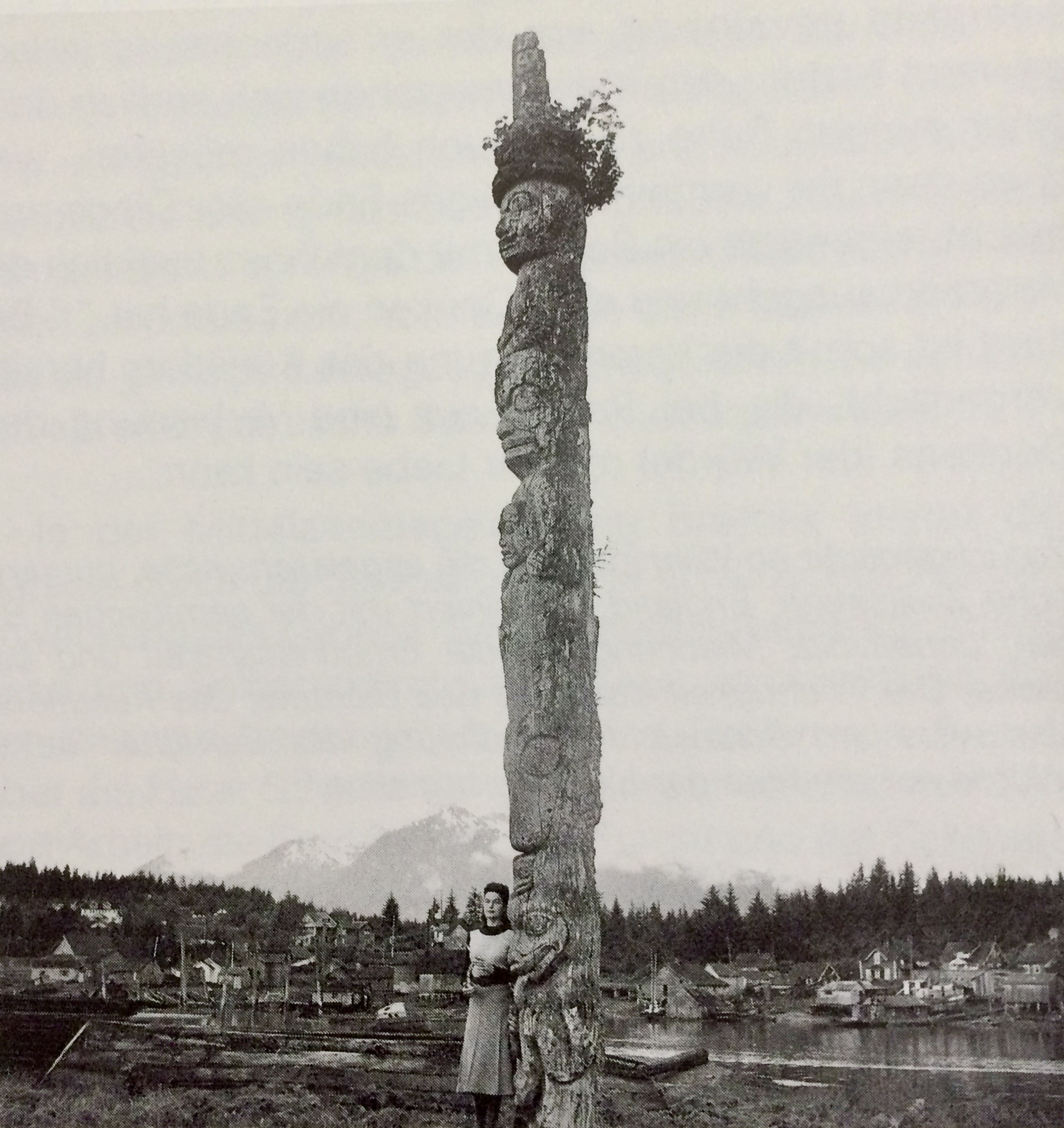
In this talk, Colin Browne will reflect on the journeys of surrealists Kurt Seligmann (Swiss), Wolfgang Paalen (Austrian), Alice Paalen (French), and Eva Sulzer (Swiss), to Alaska and British Columbia in 1938 and 1939 to experience firsthand the monumental and ceremonial arts of the Indigenous cultures of the Northwest Coast. What were they seeking, what did they find, who did they meet? How were their lives and their work impacted by their experiences? And what are the challenges associated with writing a book about these pilgrimages?
 Bio: Colin Browne is a poet, editor, documentary filmmaker, film historian, and Professor Emeritus in the School for the Contemporary Arts at SFU. His book about Paalen will be published by Talonbooks next year.
Bio: Colin Browne is a poet, editor, documentary filmmaker, film historian, and Professor Emeritus in the School for the Contemporary Arts at SFU. His book about Paalen will be published by Talonbooks next year.
Featured image: Alice Paalen at the foot of a Tlingit pole, Wrangell, Alaska (Ḵaachx̱aana.áakʼw); Photo by Eva Sulzer, with permission by Andreas Neufert.
Friday, February 4th, 2022, 1pm (PST)
“Re-storying Higher Education: Toward Indigenous Resurgence & Settler Decolonization”
by Dr. Shauneen Pete (University of Victoria)
Register in advance for this meeting : https://migration.ubc.ca/events/event/virtual-talk-with-dr-shauneen-pete/
Abstract: For the past twenty years in my work as a faculty member I have guided settler, pre-service, teacher candidates toward a deeper level of engagement with Indigeneity. I have helped them to let go of their limiting assumptions about multicultural education and guided them toward a vision for reconciliation education. Through storying I will share with you some of my pedagogical practices which allow for a deeper understanding of both Indigenous resurgence and settler decolonization; and I will re-story a vision for curriculum design in Canadian higher education, which I believe may advance our reconciliation efforts.
Bio: Dr. Shauneen Pete is from Little Pine First Nation in Treaty 6 territory. Shauneen is a mother and grandmother. She promotes the Indigenization and decolonization of higher education. As a teacher, she works toward settler decolonization in teacher education.
Dr. Pete is a Professor in Leadership Studies at the University of Victoria. She has served as the Executive Lead: Indigenization at the University of Regina. She was also the Vice-President (Academic) and interim President at First Nations University of Canada.
Friday, January 28th, 2022, 1:00 pm (PST)
Ziegler Lecture: Dr. Renae Watchman, “Trans-Atlantic Indigeneity: Indigenous Literary Presence in Europe”
Register in advance for this meeting via Zoom: https://ubc.zoom.us/webinar/register/WN_qCPC7jnqRay0IcMSD1EVFw
Join us on January 28th, 2022 at 1pm for the virtual Ziegler Lecture Series, featuring Dr. Renae Watchman of McMaster University. This talk is co-sponsored by The Narratives Group. We gratefully acknowledge the financial support of the Waterloo Centre for German Studies in the planning and organization of this virtual event in the CENES series on Indigenous Presence and Representation in German and European Studies.
Title: “Trans-Atlantic Indigeneity: Indigenous Literary Presence in Europe”
Bio: Renae Watchman is from the Diné Nation in Shiprock, NM. With a doctorate in German Studies from Stanford University (2007), she is an associate professor of English, cross-appointed with Indigenous Studies at Mount Royal University in Calgary. She is also Co-director of the Office of Academic Indigenization.
Abstract: This presentation will examine how active Indigenous presence from Turtle Island has been depicted in novels, short stories, film, autobiography, and literary criticism by contemporary Indigenous authors and filmmakers across the pond. Looking at diasporic Indigenous people who have travelled to Europe or have made Europe their second home, while still upholding their Indigenous languages and lifeways to their home communities and kin, this talk approaches the work of the “greats” of Indigenous literary arts to evaluate their depiction of distinctive Indigenous lifeways amid disparate historical and cultural contexts, seeking to centre Indigenous presence as it happens in the European context and beyond.
Wednesday, December 1, 2021, 1:00 – 2:00 PM (PST)
Keeta Gladue, “Decolonizing Disney Princesses”
Join us on December 1 at 1 pm PT for a talk on “Decolonizing Disney Princesses,” featuring Keeta Gladue. The event is co-sponsored by the Diversity and Inclusion Grant from the Waterloo Centre for German Studies.
Register in advance for this meeting via Zoom: https://ubc.zoom.us/meeting/register/u5EvduGgrzgtHtAXReq2FyOFE9yUl_GaSgxM
Title: “Decolonizing Disney Princesses”
Abstract: In this presentation, Keeta Gladue explores Disney’s representation of Indigenous female characters, how those stories are told, and what they tell us about the world around us. From what is a “true story” to Halloween costumes, “Decolonizing Disney Princesses” is about which stories are told, who tells those stories, and why.
 Bio: Keeta Gladue is a proud professional Indigenous nerd (IndigENerd) who believes in changing the world through pop culture references, humour, and storytelling. Keeta Gladue is currently serving her communities as the Indigenous Student Program Advisor for Writing Symbols Lodge. In her current role she supports diversity, equity, and inclusion as well as intercultural relationship building and anti-racism work. Cree and Métis, Keeta is also an Indigenous researcher engaged in work focused on Indigenous holistic mental health and wellbeing, academic integrity, and the decolonization and Indigenization of post-secondary institutions. She is also a registered social worker with degrees in multiple disciplines, and a current graduate student in leadership. A recent TEDx speaker, Keeta is committed to supporting intercultural engagement and understanding. As a passionate lover of learning she hopes to infect others with curiosity and wonder about how the world works, and even more, inspire them to imagine and work towards what it could be.
Bio: Keeta Gladue is a proud professional Indigenous nerd (IndigENerd) who believes in changing the world through pop culture references, humour, and storytelling. Keeta Gladue is currently serving her communities as the Indigenous Student Program Advisor for Writing Symbols Lodge. In her current role she supports diversity, equity, and inclusion as well as intercultural relationship building and anti-racism work. Cree and Métis, Keeta is also an Indigenous researcher engaged in work focused on Indigenous holistic mental health and wellbeing, academic integrity, and the decolonization and Indigenization of post-secondary institutions. She is also a registered social worker with degrees in multiple disciplines, and a current graduate student in leadership. A recent TEDx speaker, Keeta is committed to supporting intercultural engagement and understanding. As a passionate lover of learning she hopes to infect others with curiosity and wonder about how the world works, and even more, inspire them to imagine and work towards what it could be.
Thursday, November 18, 2021, 11:00 AM – 12:30 PM (PST)
Virtual Talk with Dr. Roger Bromley (University of Nottingham): ‘Less than human’: Examining the Representation of Refugees through the Lens of Decoloniality
Register here via RSVP form:
Co-sponsored by the UBC Centre for Migration Studies – Narratives Group and Hosted by UBC Centre for Migration Studies – Mobilities Group
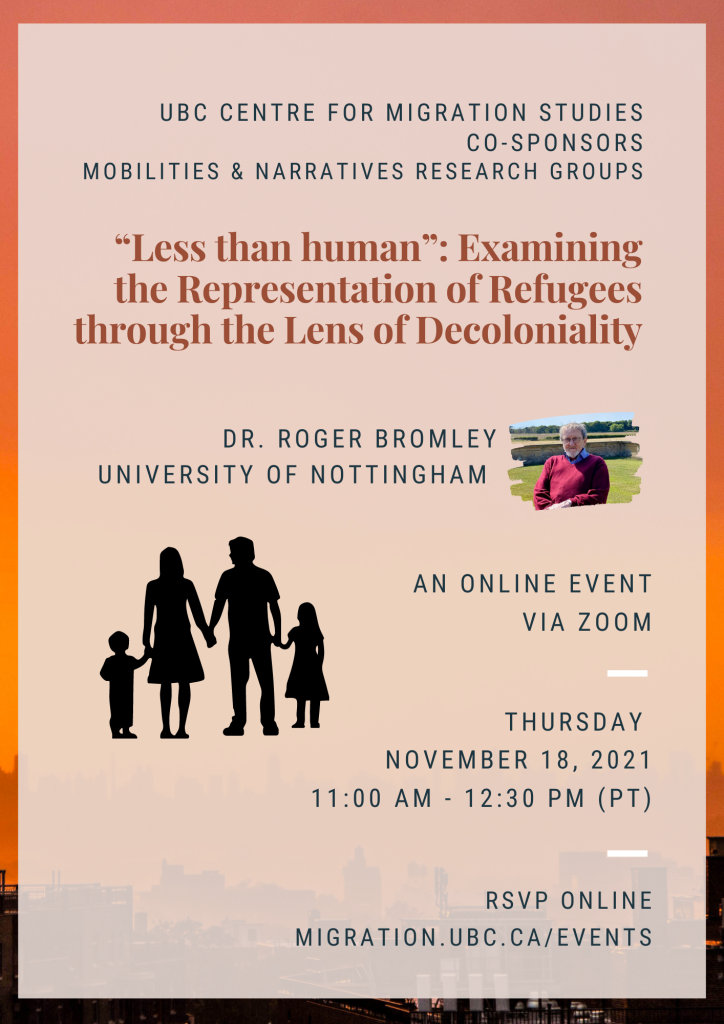 Abstract: In recent years, my research has mainly been concerned with the political, economic and cultural implications of displacement. In carrying out this work I have used a number of concepts, including the ways in which European/Western societies have employed the idea of ‘the Other’ to create a sense of belonging, identity and social status for its citizens through varying forms of ‘ethno-nationalism’. Linked with this is a consideration of the historical, cultural and discursive processes through which the ‘Other’ is constructed in Western contexts – refugees in particular. The recent finding of the 1300 graves of First Nations’ children in Canadian residential schools is a tragic example of this.
Abstract: In recent years, my research has mainly been concerned with the political, economic and cultural implications of displacement. In carrying out this work I have used a number of concepts, including the ways in which European/Western societies have employed the idea of ‘the Other’ to create a sense of belonging, identity and social status for its citizens through varying forms of ‘ethno-nationalism’. Linked with this is a consideration of the historical, cultural and discursive processes through which the ‘Other’ is constructed in Western contexts – refugees in particular. The recent finding of the 1300 graves of First Nations’ children in Canadian residential schools is a tragic example of this.
Other than Achille Mbembe’s ‘necropolitics’, which I will briefly outline, I shall also use the concepts of disposability, ‘lives unworthy of living’ (adapted by the Nazis) and racialized dehumanization. As an overall framework for understanding and analysis, in this seminar I will be examining the complex symbolic-material nets of coloniality through the concept of the ‘coloniality of power’ developed by a number of Latin-American theorists in terms of decoloniality.
Apart from these theoretical concepts which are developed in the opening chapter of my recent book (Narratives of Forced Mobility and Displacement in Contemporary Literature and Culture) and connected to them, I shall be looking at a range of issues related to the representation of refugees in, often reductive, Western discourses/texts/media – the sentimentalised, passive victim, the vulnerable person, the object of compassion/hate, the agential subject, the resistant activist (‘actors in their own lives’) and the newly emergent citizen. This involves a number of methodological challenges. The experience of refugees is unrepresentable in a sense, an ‘unimaginable existence’ for most of us, and representational forms are always inadequate but this does not mean giving up on any attempt. Rather, it means the development of ‘other lenses for perception’, a greater aesthetic-political reflexivity and sensitivity, a search for new, and radical, rhetorical strategies, linguistic and stylistic resources which unsettle, defamiliarize, and disrupt expectations and preconceptions, the ‘always already known’ other. By exploring the limits of sympathy, the shortcomings of the liberal claim of common humanity, and insisting on the ethical dimensions of representation, it may be possible to discover interventions in film, the novel, art, music and drama which subvert the presumption of ‘knowing the refugee’. One example of such an ‘intervention’ will be briefly referred to: No Friend but the Mountains by Behrouz Boochani, ‘the true story of an illegally imprisoned refugee on Manus Island, Papua New Guinea’. Roger Bromley (University of Nottingham)
Bio: Roger Bromley is Emeritus Professor in Cultural Studies at the University of Nottingham, and was a Visiting Professor at Lancaster University until 2017. From 1964 to 2010 he taught in a range of universities in the USA and the UK. He is the author of Lost Narratives: Popular Fictions and Politics (1988); Narratives for a New Belonging: Diasporic Cultural Fictions (2000), From Alice to Buena Vista: the Cinema of Wim Wenders (2001) and joint editor of four other books. His most recent book, Narratives of Forced Mobility and Displacement in Contemporary Literature and Culture was published by Palgrave Macmillan in June of this year.
Thursday, October 14, 2021, 11:00 AM – 12:30 PM (PST)
Ziegler Lecture: Author Reading and Discussion with Zafer Şenocak on Berlin, “The Capital of the Fragment”
Join us on October 14th at 11 am (PST) for the virtual Ziegler Lecture Series, featuring Zafer Şenocak, and co-organized by the UBC Centre for Migration Studies.
Register here via Zoom: https://ubc.zoom.us/meeting/register/u5AodOqqrjIjHtYHIjPbXunpzpgN7YggKgpl
Abstract: As part of UBC’s Dept. of CENES Ziegler Lecture Series, Şenocak will read from his essay on Berlin, “The Capital of Fragment,” and discuss narratives of postmigration with Prof. Markus Hallensleben from UBC’s Centre for Migration Studies Narratives Research Group.
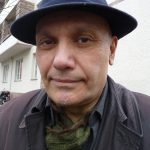 Bio: Zafer Şenocak, born in Turkey, moved as a child to Germany and lives since 1989 in Berlin as a freelance writer. He has written widely on the issues of diversity in Germany, migration and exile, the Turkish diaspora, and the short distances and large fears of a globalizing Europe. The historical background of mixed and broken identities is a key issue in his novels, creating a special fragmented form of memory and storytelling. His writing includes poems in German and Turkish, novels and long essays. He is also a frequent contributor to nationwide German newspapers, such as Die Tageszeitung, Der Tagesspiegel and Die Welt. Şenocak’s work is translated into Spanish, Italian, French, English and Czech. He was writer in residence at US-Universities, such as Berkeley, M.I.T., Oberlin College, Dartmouth College, University of Arizona. A volume of his poems written in German was translated by Elizabeth Oehlkers-Wright: Door Languages, Boston, 2008. His essay collection Atlas of a Tropical Germany, University of Nebreska Press, 2000, was edited and translated by Prof. Leslie A. Adelson. His novel Gefährliche Verwantschaft was translated into Spanish, French, Turkish and into English as Perilous Kinship by Prof. Tom Cheesman.
Bio: Zafer Şenocak, born in Turkey, moved as a child to Germany and lives since 1989 in Berlin as a freelance writer. He has written widely on the issues of diversity in Germany, migration and exile, the Turkish diaspora, and the short distances and large fears of a globalizing Europe. The historical background of mixed and broken identities is a key issue in his novels, creating a special fragmented form of memory and storytelling. His writing includes poems in German and Turkish, novels and long essays. He is also a frequent contributor to nationwide German newspapers, such as Die Tageszeitung, Der Tagesspiegel and Die Welt. Şenocak’s work is translated into Spanish, Italian, French, English and Czech. He was writer in residence at US-Universities, such as Berkeley, M.I.T., Oberlin College, Dartmouth College, University of Arizona. A volume of his poems written in German was translated by Elizabeth Oehlkers-Wright: Door Languages, Boston, 2008. His essay collection Atlas of a Tropical Germany, University of Nebreska Press, 2000, was edited and translated by Prof. Leslie A. Adelson. His novel Gefährliche Verwantschaft was translated into Spanish, French, Turkish and into English as Perilous Kinship by Prof. Tom Cheesman.
Thursday, June 24, 2021, 7:00 AM – 10:30 AM (PST)
CES CONFERENCE PANELS ON POLITICS OF POSTMIGRATION
The term postmigration has been employed as theoretical frame within European Social Studies, for rethinking migration studies, the political borders of Europe, the history of colonialism, and further how to decentralize a Western European narrative of belonging. However, the term postmigrant foremost derived from the artistic practice by artists that have been racialized, marginalized and excluded, although most of them were born or at least socialised in the very core of Europe. Thus, postmigrant was employed as a label to free themselves from racist, colonial, derogatory and diminishing attributions (Azadeh Sharifi).
In two panels, we will explore what the term postmigrant can give us in times when belonging is again contested in public discourse, and when it seems more urgent than ever to understand the contemporary operations of racist violence and imperial nostalgia. How does postmigrant literature, film and aesthetics help us understand the operations of exclusion and oppression today? In other words, does postmigrant lead us down the neoliberal path of ‘positive images,’ of ‘people of colors,’ ‘empowerment’ and ‘self-care,’ while forestalling a more aggressive reckoning with systemic, structural exclusion? (Katrin Sieg)
Fatima El-Tayeb even went a step further and argued that postmigration, promoted as mainstream discourse without radicalising society by adequately addressing its racial inequalities, might only serve to stabilize political hegemony and its derogatory implications. Furthermore, there is a danger that colonial structures are reiterated in academics by theorizing refugees, immigrants, and Indigenous people, rather than by finding practical methods of ‘migrantizising’, ‘Indigenizing’ and ‘decolonizing’ the institutions.
Beyond Politics of Belonging – Part 1
Moderation: Sten Moslund – SDU, Discussant: Katrin Sieg – Georgetown University
Radical Conviviality: Towards Allying in Spaces of Post-Otherness (Regina Römhild – Humboldt U / Bonaventure Soh Bejeng Ndikung – Savvy Contemporary, Berlin)
Deconstructing and Unsettling Politics of Belonging through Narratives of Radical Diversity and Indigenous Storytelling (Markus Hallensleben – UBC)
Activist Scholarship – Does Postmigrant Theory “Harms Everybody”? (Moritz Schramm – University of Southern Denmark)
Beyond Narratives of Belonging – Part 2
Moderation: Moritz Schramm – SDU / Markus Hallensleben (UBC), Discussant: Azadeh Sharifi – Ludwig Maximillians University Munich
Space is not Neutral: Placemaking in the High-rise of K. Taha’s “Beschreibung einer Krabbenwanderung” (Dorothee Leesing – UBC)
Reconceptualising Belonging in Germany: Postmigrant Readings of Two Selected Works (Ajibola Akin Fabusuyi – UBC)
Sabri Louatah’s Les Sauvages: A Postmigrant Dystopia? (Alvaro Luna – Université de Limoges)
Organizer: Markus Hallensleben, CES
November 12, 2020
MARKUS HALLENSLEBEN: DECONSTRUCTING EUROCENTRIC POLITICS OF BELONGING THROUGH LITERARY AND VISUAL NARRATIVES OF PLURAL RELATIONS
My talk will discuss literary and visual narratives of plurality that suggest a relational, intersectional way of connecting cultures. These narratives are often directed against hegemonial discourses of belonging and can be seen as counter narratives to Eurocentrism, colonialism, sedentarism and patriarchalism. They can, nevertheless, be place based and vernacular, and at the same time promote cosmopolitanism and super-diversity. Whether they are earth based, as in the installations and performances of Otobong Nkanga, or bodily centred, as in the writings of Billy-Ray Belcourt, they make us aware of the problematic and violent politics of seeing the land and the people as resources, rather than listening to their voices as necessarily corrective sources for a societal change. Similarly, new narratives of a postmigrant society and “Radical Diversity” (Max Czollek) have emerged in German-language texts and films that deconstruct a Eurocentric politics of belonging. By building plural relations between religions and cultures, they give refugees and immigrants agency and openly criticize socio-political concepts of integration that are built on the principle of a dominant and “guiding culture”. I will analyse these narratives under the assumption that cultural identities are constructed performatively and that cultures have to be seen dynamic and confluent. However, being myself entangled as an uninvited guest and settler here in Vancouver, my goal is not to compare similar political activisms coming from different cultural backgrounds, I rather look for queer narratives of self-governing, self-determination and self-precarity. Finally, I will ask how we can, with the words of Chantal Mouffe, “transform an antagonism into an agonism” (Hegemony, Radical Democracy, and the Political, 2013) and aim for a scholarly activism that won’t reiterate Eurocentrism within and outside Europe.
Organizer: Centre for Migration Studies
October 22, 2021
Reading and Lecture with Ilija Trojanow on “Confluences post Migration”
German-language pre-eminent literary novelist, essayist, translator and publisher Ilija Trojanow will read from his book Nach der Flucht (After the Flight) and will lecture about Confluences between Eastern and Western cultures, followed by a Q&A session on topics such as narratives of forced migration, fake news and populist politics.
Organizer:
June 24, 2020
VIRTUAL CONFERENCE: POSTMIGRANT AESTHETICS: HOW TO NARRATE A FUTURE EUROPE?
The increased numbers of refugees entering Europe since 2015 has put an urgency to discussions on European self-understanding and identity. In which way is Europe, anthropologist Regina Römhild asks, ‘characterized by a long-term presence of migration’ which is partly neglected or made invisible in public discourse (Römhild 2018: 69)? How can we methodologically develop an understanding of Europe as a postmigratory space that is fundamentally shaped by earlier and ongoing migration movements? How can the concept of postmigration help us to grasp the overall negotiations and conflicts taking place in society?
In two panels we will examine postmigrant narratives as playing a crucial part in challenging collective core narratives and the politics of belonging in plural societies. Our aim is to establish a set of criteria for a new transformative aesthetics that renegotiates and changes political perspectives. We will thus show how literature and film, by questioning binary concepts of hybridity, diversity, integration and belonging, can provide sociopolitical counter-narratives to Eurocentric, ethnically and nationally centred visions of society and cultural identity. The material investigated reaches from cross-mediterrean mobilities and autoethnographic writings about Italy and the Balkan region to Algerian-French film, from the indigene Black British novel to German- and Danish-language literatures that address topics such as genealogies of self-making, ecocriticism and radical diversity within a European context. We will further critically discuss the theoretical implications of an aesthetics of postmigration as a possible new analytical turn in cultural studies.
Organizer: Markus Hallensleben
January 14, 2020
DEPT. OF CENES ZIEGLER LECTURE SERIES: MORITZ SCHRAMM (SDU), “RADICAL DIVERSITY: POSTMIGRANT PERSPECTIVES ON ART, CULTURE, AND POLITICS”
In recent years, the concept of postmigration and the notion of a postmigrant society have had a significant impact on the social sciences, as well as in the humanities in Europe. Partly growing out of the theatre scene in Berlin, Germany, postmigration is often seen as a political catchword or even a critical intervention in both public and academic discourses on migration and integration. The term does not signal an end of migration, but rather refers to the overall negotiations and conflicts taking place in societies that are fundamentally shaped by earlier and ongoing migration movements. In my lecture, I will introduce the developing concept of postmigration and its academic reception, before exploring it as an analytical perspective, reframing or even challenging widespread concepts such as ‘super-diversity’ and ‘multiculturalism’. With a focus on the idea of ‘radical diversity’, insisting on the undisputable multiplicity of all individual backgrounds, the paper wants to discuss the consequences of the new concept for art and culture, as well as for politics.
Organizers: Markus Hallensleben, Sabine Zimmermann, and co-sponsored by the UBC Institute for European Studies.